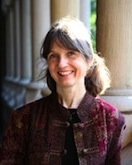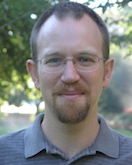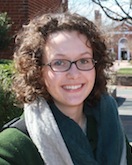 Susan Holman, member of the first Virginia Seminar in Lived Theology and author of God Knows There’s Need: Christian Responses to poverty, delivered an invited lecture in early April at the Kenan Institute for Ethics at Duke University, as part of a series on “Religion and Public Life.” Her April 9 lecture, at Duke Divinity School, explored the intersections of “Public Health, Poverty, and Patristics,” and is available online here. Other speakers in the series included Cardinal Francis George, the Catholic Archbishop of Chicago, on “Catholic Social Teaching and Economic Globalization,” Jose Casanova (Georgetown) on “Post-secularization, Globalization and Poverty,” Ruth Marshall (University of Toronto) on “Pentecostalism, Poverty, and Power,” Katherine Marshall (Georgetown) on “Religion and Development,” and Peter van der Veer (Max Planck Institute) on “The Spiritual, the Secular and the Poor in India and China.”
Susan Holman, member of the first Virginia Seminar in Lived Theology and author of God Knows There’s Need: Christian Responses to poverty, delivered an invited lecture in early April at the Kenan Institute for Ethics at Duke University, as part of a series on “Religion and Public Life.” Her April 9 lecture, at Duke Divinity School, explored the intersections of “Public Health, Poverty, and Patristics,” and is available online here. Other speakers in the series included Cardinal Francis George, the Catholic Archbishop of Chicago, on “Catholic Social Teaching and Economic Globalization,” Jose Casanova (Georgetown) on “Post-secularization, Globalization and Poverty,” Ruth Marshall (University of Toronto) on “Pentecostalism, Poverty, and Power,” Katherine Marshall (Georgetown) on “Religion and Development,” and Peter van der Veer (Max Planck Institute) on “The Spiritual, the Secular and the Poor in India and China.”
Singing Church: Project alum Peter Slade explores congregational singing
 Project on Lived Theology alum Peter Slade has been awarded a writing grant by the Project on Lived Theology for his book project, Singing Church: A Lived Ecclesiology of Congregational Singing. The grant will support research and writing over the next year.
Project on Lived Theology alum Peter Slade has been awarded a writing grant by the Project on Lived Theology for his book project, Singing Church: A Lived Ecclesiology of Congregational Singing. The grant will support research and writing over the next year.
Dr. Slade’s research will ask, how does our understanding of church shape our congregational singing and how does our understanding of congregational singing shape our churches in the United States? He will pay particular attention to the lived theologies of churches that have developed distinctive practices of congregational singing in their work of uniting the body of Christ across racial, ethnic and generational lines in the praise of God. Continuing the work he started in his book Open Friendship in a Closed Society, he will develop the ecclesiology of open friendship to explore congregational singing as a vital constitutive practice of the Church: the community of reconciled enemies.
Peter Slade received a doctorate degree in religious studies at the University of Virginia in the spring of 2006. His dissertation, Open Friendship in a Closed Society: Mission Mississippi and a Theology of Friendship, brings the lived experience of an ecumenical racial reconciliation initiative in Jackson, Mississippi into conversation with academic theologies of reconciliation and friendship. His research and teaching marry his interest in practical theology and history with a particular focus on race, social justice and the American south. Prior to studying at U.Va., Slade earned an M.A. in southern studies from the University of Mississippi and a B.D. with honours in Christian ethics and practical theology from St. Andrews University, Scotland. He also worked for five years as a community development worker for the Church of England during which time he studied at Ruskin College, Oxford. Slade held a dissertation fellowship from the Louisville Institute for The Study of Protestantism and American Culture and was a fellow at U.Va.’s Center on Religion and Democracy. In 2004, he was an honoree in the Seven Society Graduate Fellowship for Superb Teaching. Slade is currently an associate professor in the religion department at Ashland University in Ashland, Ohio. Read Slade’s author interview.
Fellow Traveler Sam Lloyd: “We, too, are victims of this despicable act.”
 The Rev. Samuel T. Lloyd III is interviewed about the effects of not being able to enter Trinity Church since the bombing in Boston this past week. In this Boston Globe article he states: “At a time like this, people want to come together. The need to have a spiritual conversation together as a community is powerful. And right now, we at Trinity haven’t been able to do that.” Rev. Lloyd is former dean of the National Cathedral and current member of the Virginia Seminar in Lived Theology. He currently serves as priest-in-charge at Trinity Church Boston.
The Rev. Samuel T. Lloyd III is interviewed about the effects of not being able to enter Trinity Church since the bombing in Boston this past week. In this Boston Globe article he states: “At a time like this, people want to come together. The need to have a spiritual conversation together as a community is powerful. And right now, we at Trinity haven’t been able to do that.” Rev. Lloyd is former dean of the National Cathedral and current member of the Virginia Seminar in Lived Theology. He currently serves as priest-in-charge at Trinity Church Boston.
The Project on Lived Theology Announces Summer Interns
 The Project on Lived Theology has selected three U.Va. students for the Summer Internship in Lived Theology 2013. Kate Farrell, Camille Loomis, and Reilly O’Hara will spend the summer exploring how service informs and shapes religious belief, and how religious belief informs and shapes service. The Summer Internship in Lived Theology offers the unique opportunity to pursue service as an explicitly theological activity. Interns’ reading, writing, and conversation with their mentors enable them to reflect on their work theologically.
The Project on Lived Theology has selected three U.Va. students for the Summer Internship in Lived Theology 2013. Kate Farrell, Camille Loomis, and Reilly O’Hara will spend the summer exploring how service informs and shapes religious belief, and how religious belief informs and shapes service. The Summer Internship in Lived Theology offers the unique opportunity to pursue service as an explicitly theological activity. Interns’ reading, writing, and conversation with their mentors enable them to reflect on their work theologically.
Meet our interns and learn about their plans below. Then visit our internship page to learn about past interns and their work, and to read our intern blog.
 Kate Farrell grew up in Roanoke, and in 2009 she began to develop an interest in Catholic social teaching through encounters with the refugee population in her hometown. Relationships formed with this marginalized community through an internship in 2011 with Commonwealth Catholic Charities shaped and solidified her conviction that engaging in social justice is a necessary component of living the Catholic faith. Throughout her years at U.Va., Kate has engaged in practices of social justice in the Charlottesville community, but seeks to bring her interest in social justice into conversation with her academic studies in religion and studio art through an internship with the Catholic Worker community outside of London.
Kate Farrell grew up in Roanoke, and in 2009 she began to develop an interest in Catholic social teaching through encounters with the refugee population in her hometown. Relationships formed with this marginalized community through an internship in 2011 with Commonwealth Catholic Charities shaped and solidified her conviction that engaging in social justice is a necessary component of living the Catholic faith. Throughout her years at U.Va., Kate has engaged in practices of social justice in the Charlottesville community, but seeks to bring her interest in social justice into conversation with her academic studies in religion and studio art through an internship with the Catholic Worker community outside of London.
Throughout the summer, Kate plans to study ways in which theology is practiced through social activism by studying the Catholic Worker movement, other Catholic groups or notable activists, and other religious groups. She will make comparisons between these different persons and groups and the original intent and workings of the Catholic Worker house as started by Dorothy Day and Peter Maurin. In addition to this academic study, Kate plans to create a body of artwork based on her experience at the Catholic Worker Farm.
 Camille Loomis is a third year student majoring in religious studies and art history. In her academic study, Camille has explored the relationship between faith and art, particularly sacred art of the medieval period. Camille is especially fond of theological questions concerning the aesthetic and mystic mind. A lifelong musician, Camille has also served as music director for her student theatre group and a cappella vocal group.
Camille Loomis is a third year student majoring in religious studies and art history. In her academic study, Camille has explored the relationship between faith and art, particularly sacred art of the medieval period. Camille is especially fond of theological questions concerning the aesthetic and mystic mind. A lifelong musician, Camille has also served as music director for her student theatre group and a cappella vocal group.
Camille will spend the summer volunteering with The Haven, a day shelter in Charlottesville for homeless and very poor folks. Day to day operations of The Haven include greeting and socializing with the visitors, serving meals in the kitchen, providing access to showers, laundry, storage, and computers, and directing visitors to service providers in the building. Camille will explore how faith informs the running of The Haven.
As an extension of her interest in the relationship between spiritual expression and art, Camille hopes to instate an art project for the volunteers and guests of The Haven. Her vision is to create and support some sort of ongoing arts and crafts station for guests, perhaps where they can paint, make jewelry, or learn simple songs on the keyboard or harmonica. The purpose of this arts endeavor is to develop a sense of community encouraged by common artistic undertaking, and to foster a safe space to express personal identity.
 Reilly O’Hara is a third year religious studies and foreign affairs double major from Falls Church, Virginia. He transferred last year from University of South Carolina and has loved U.Va. since he first stepped on grounds.
Reilly O’Hara is a third year religious studies and foreign affairs double major from Falls Church, Virginia. He transferred last year from University of South Carolina and has loved U.Va. since he first stepped on grounds.
Reilly hopes to work with two organizations this summer–School for Conversion and Urban Hope–both in Durham, NC. School For Conversion (SFC) is a non-profit headed by Jonathan Wilson-Hartgrove. It follows closely with the ideals of New Monasticism as it seeks to realize strong community in the “margins of society.” The programs and initiatives of SFC are aimed at social reconciliation and development and are realized through this deep sense of community. Reilly is planning an administrative internship with SFC to explore the inner workings of a non-profit including event planning, writing, research, and accounting.
Urban Hope is a camp in an economically under-resourced part of Durham called Walltown. The camp serves 30-40 Walltown youth from grades 5-10 and has five primary focuses: career and entrepreneurial development, spiritual development, leadership development, recreation, and financial literacy. Through both formal and informal means, the program seeks to develop the kids both practically and spiritually, equipping them for success in both areas. The Walltown area is an urban setting of great need and this program concentrates on the youth, the future of this community, in an effort to increase overall quality of life.
